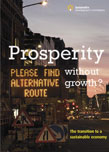Ressources
 The economy is geared, above all, to economic growth. Economic policy in the current recession is all about returning to growth – but an economic crisis can be an opportunity for some basic rethinking and restructuring.
The economy is geared, above all, to economic growth. Economic policy in the current recession is all about returning to growth – but an economic crisis can be an opportunity for some basic rethinking and restructuring.
Two objectives other than growth – sustainability and wellbeing – have moved up the political and policy-making agenda in recent years, challenging the overriding priority traditionally given to economic growth.
SDC’s "Redefining Prosperity" project has looked into the connections and conflicts between sustainability, growth, and wellbeing.
As part of a two year programme of work, we commissioned thinkpieces, organised seminars, and invited feedback. This project has now resulted in a major SDC report : ’Prosperity without Growth ? : the transition to a sustainable economy. Download here’ by Professor Tim Jackson, SDC’s Economics Commissioner. Prosperity without growth ? analyses the relationship between growth and the growing environmental crisis and ’social recession’. In the last quarter of a century, while the global economy has doubled, the increased in resource consumption has degraded an estimated 60% of the world’s ecosystems. The benefits of growth have been distributed very unequally, with a fifth of the world’s population sharing just 2% of global income. Even in developed countries, huge gaps remain in wealth and well-being between rich and poor.
While modernising production and reducing the impact of certain goods and services have led to greater resource efficiency in recent decades, our report finds that current aspirations for ’decoupling’ environmental impacts from economic growth are unrealistic. The report finds no evidence as yet of decoupling taking place on anything like the scale or speed which would be required to avoid increasing environmental devastation.
Prosperity without growth ? proposes twelve steps towards a sustainable economy and argues for a redefinition of "prosperity" in line with evidence about what contributes to people’s wellbeing.
SDC intends to generate discussion and debate on the challenges on the issues that Prosperity without Growth ? raises. We have sent the report to the Prime Minister, government leaders in the devolved administrations, the Chancellor of the Exchequer, and other government ministers, as well as business and civil society leaders.


